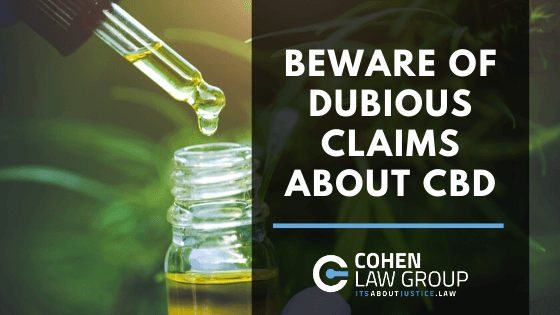Beware of Dubious Claims About CBD
By Kevin Vorhis, Esq.
In recent months, new products containing cannabidiol, otherwise known as CBD, have flooded in to the American marketplace. From essential oils and tinctures, to CBD-infused water and food, to health and beauty products containing cannabidiol, CBD products have rapidly gained in popularity and become widely available to consumers in just a few short months.
Many manufacturers of CBD-infused products tout CBD’s purported medicinal properties. While the majority of these claims are benign, some manufacturers have brought dubious and unsubstantiated claims about CBD’s curative effects. From claims that CBD can stop cancer in its tracks, to claims that it can effectively treat Parkinson’s and Alzheimer’s disease, these health claims are simply not yet supported by reliable scientific or clinical evidence.
In light of CBD’s growing popularity, CBD-containing products and the claims surrounding them have faced increased scrutiny by the Food and Drug Administration, the Federal Trade Commission, and a variety of consumer protection groups and attorneys.
What CBD Is & How It Is Used
By way of background, cannabidiol is an organic chemical compound that occurs naturally in the Cannabis sativa plant. It can be chemically isolated and extracted from hemp and solubilized in organic solvents to create CBD oil, which can then be incorporated readily into a variety of products.
When ingested by humans, the pharmacological effects of CBD are only partially understood. It is metabolized in the liver and small intestines, and has been demonstrated to act on a handful of receptors in the brain; however the full pharmacological effects of CBD are not yet fully known.
CBD has been clinically shown to effectively treat two rare forms of childhood epilepsy. There is likewise preliminary data suggesting that CBD may be effective as an anti-inflammatory drug, which may aid in the development of treatments that could ease chronic pain disorders such as arthritis.
Importantly, however, there is only limited data demonstrating CBD’s efficacy in treating other neurological and mental disorders, including anxiety, depression, or sleep disorders. Long story short, the jury is still out as to whether CBD is an effective treatment for anything beyond the very limited uses described above.
Safety & Regulation
It is estimated by one market research firm, Brightfield Group, that by 2023 the CBD market will surpass $23 billion in annual U.S. sales.
As of this writing, CBD can be produced without any kind of regulation, leading to concerns about the potency, purity, and safety of these products. Coupled with the as-yet unknown effects of CBD on the human body, and the unsubstantiated medical claims about CBD from certain manufacturers, there is growing alarm about the current legal status of the CBD industry, and concomitant calls for increased regulation.
In a press release in September 2019, the Food and Drug Administration stated some of its concerns: “…we want to be clear that a number of questions remain regarding CBD’s safety – including reports of products containing contaminants, such as pesticides and heavy metals – and there are real risks that need to be considered.” The FDA went on to state that it has concern that long-term CBD use may cause liver damage, or may affect the efficacy and metabolism of other drugs in the liver.
Currently CBD is legal in all fifty states, with varying degrees of restrictions.
The recent inclusion of CBD in consumer products traces its origins to the 2018 Farm Bill, which legalized the cultivation of industrial hemp. On August 26, 2019, the DEA announced that hemp and hemp-based products containing less than 0.3% THC would no longer be considered a controlled substance under the Controlled Substances Act.
This overall pattern of unwinding federal restrictions with respect to hemp cultivation has demonstrably paved the way for the current influx of CBD-infused products.
Warning Letters From The FTC & FDA
By contrast, both the Food and Drug Administration, and the Federal Trade Commission have taken a more skeptical approach, increasing their scrutiny of the CBD marketplace and its participants.
In September 2019, the Federal Trade Commission sent warning letters to three companies that were advertising their CBD-infused products as treatments for serious diseases. In these letters, the FTC warned that “it is illegal to advertise that a product can prevent, treat, or cure human disease without competent and reliable scientific evidence to support such claims”. These unnamed targeted companies made claims that “CBD ‘works like magic’ to relieve ‘even the most agonizing pain’ better than opioid painkillers”. Some went on to claim that CBD was “clinically proven” to treat cancer, Alzheimer’s disease, multiple sclerosis, fibromyalgia, autism, anorexia, PTSD, and more. The FTC warned that, “selling CBD products without [ ] substantiation could violate the FTC Act”.
Likewise, on November 25, 2019, the Food and Drug Administration issued warning letters to fifteen companies for illegally selling products containing CBD in a way that violated the Food, Drug, and Cosmetic Act. Under the Food, Drug, and Cosmetic Act, any product intended to treat a disease, or intended to have a therapeutic or medical use, is considered a drug. Due to the nature of the claims being made about CBD by these fifteen companies, the FDA asserted its ability to regulate CBD as a drug. Because the FDA has not approved any CBD products, other than the abovementioned epilepsy treatment, the FDA concluded that these companies violated the Food, Drug, and Cosmetic Act by illegally selling CBD-infused food, because it was both a drug ingredient, and also because it was an unapproved food additive.
Legal Actions Taken
In recent months, Plaintiffs’ attorneys have brought lawsuits against companies selling CBD products, based on allegedly unlawful advertising practices by these companies.
In Potter v Potnetwork Holdings, Inc., Diamond Cbd, Inc., And First Capital Venture Co., Case No. 1:19-cv-24017, (S.D. Fla. Sept. 27, 2019), the plaintiff/consumer brought a class action law suit against CBD food manufacturers alleging that they violated the Florida Deceptive and Unfair Trade Practices Act (“FDUTPA”) by selling CBD-infused foods that contained less CBD than advertised.
Similarly, in Gaddis v. Just Brands USA Inc. et al, Case No. 19-cv-62067 (S.D. Fla. Aug. 16, 2019), the plaintiff/consumer also alleged that the Defendant violated FDUTPA by selling products with substantially less than the advertised amounts of CBD.
Notably, these suits focus primarily on the manufacturers’ alleged claims regarding the amount of CBD contained within the advertised products in question, rather than on any unsubstantiated health claims made by these products.
Looking Ahead
Given that the CBD market is likely to increase to billions in annual sales in the coming years, and given that the full effects of CBD are not yet fully known, it seems apparent that the legal fight about CBD products is only just beginning.
Viewing state consumer protection/trade practice laws in conjunction with the recent federal regulatory actions carried out by both the FTC and FDA, it is likely that governmental scrutiny over CBD products and the claims made by their manufacturers will continue to increase. Likewise, consumer lawsuits against CBD manufacturers are also bound to increase with the volume of CBD sales and the number of participants in that market.
If you have any questions regarding a particular CBD product that you purchased, or if you are concerned that the advertising claims made by a CBD product that you purchased are inaccurate, contact our office. We may be able to help evaluate whether you have a claim. Call us at (407) 478-4878.

Kevin Vorhis, Esq.
DISCLAIMER: This website is for informational purposes only and does not provide legal advice. Please do not act or refrain from acting based on anything you read on this site. Using this site or communicating with Cohen Law Group through this site does not form an attorney/client relationship. This site is legal advertising. Please review the full disclaimer for more information by clicking here.








